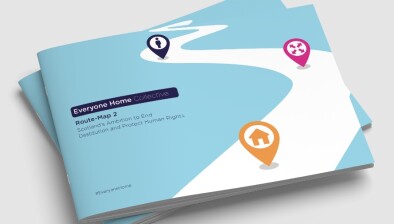Philip Whyte: Scrap the cap - if not us, who?

Philip Whyte
Philip Whyte, director of IPPR Scotland, discusses the need for the Scottish Government to scrap the two-child limit for Universal Credit or Child Tax Credits.
With Keir Starmer’s refusal to commit to scrapping it should Labour form the next UK government, the two-child limit has understandably been a big focus of public and political attention this week.
As a brief reminder: introduced in 2017, the policy limits the number of children (born after April 2017) that a household can receive Universal Credit or Child Tax Credits for. There are some exceptions – most notoriously, the ‘rape clause’ which provides payments for third children born as a result of rape, by forcing survivors to go through a dehumanising process and relive the trauma.
Recent figures from CPAG show that around one in 10 children (1.5 million) are affected by the two-child limit, around 80,000 of whom are in Scotland. It is a policy that has plunged hundreds of thousands of families into poverty with analysis from the Resolution Foundation estimating the bottom 20 per cent of households are around £780 a year worse off as a result of the two-child limit, growing to £1,310 a year by 2035 when it is fully rolled out (i.e. when the birth date cut-off ages out).
Some of the political rhetoric we have seen in support of the policy suggests – at best – a disconnect from the realities of the lives of people affected. Any policymaker who thinks a woman would go through nine months of pregnancy, and a family 18 years of raising a child, for around £15 a week should potentially reconsider their career choice.
All in, it is a harmful and regressive policy – born out of the very worst aspects of austerity and punitive welfare reform –which should be consigned to the scrapheap of history.
But if the current, and a hypothetical future, UK government refuses to scrap the cap, then who else can? The obvious answer is the Scottish Government.
The refrain from the Scottish Government when similar calls have been made is that the two-child limit was a policy decision of a UK government, and the onus must be on a UK government to scrap it.
To an extent that is an understandable political response. Indeed, a big feature of the constitutional debate in recent years has been underscored by the notion of a shared ‘social solidarity’ which should transcend borders. But there is an element of hypocrisy from those who laud the idea that such social solidarity is a hallmark of UK politics, but then demand mitigation of reserved policies when it fails in one part of the country.
But children being plunged into poverty cannot be a candidate for political point scoring. IPPR Scotland’s focus has always been on how we can use the powers of devolution to forge a more progressive path here in Scotland and tackle the stubbornly persistent poverty and inequality that pervades society, and we must look to those powers to forge a different path on child poverty now.
Treating the border like a tennis net where the ball is rallied back and forth is a denial of the impact the two-child limit is having and an abdication of responsibility to the children and families suffering from it. People deserve a more inspiring vision of politics and politicians of any colour must be judged on their political choices in delivering that – whether those choices are active or passive.
The absence of leadership and action at a UK level shouldn’t excuse that in Scotland – particularly when the opposition to the two-child limit by the Scottish government, together with its big promises of bold action on social security through things like a minimum income guarantee, has been so strong.
Devolution exists to allow the Scottish Government to make different choices.
That same belief gave us the introduction of the Scottish Child Payment and, more pertinently, saw the Scottish Government commit funding to mitigate the bedroom tax and benefit cap. So, the question becomes, why is it right to mitigate certain policies with one hand while sitting on the other?
There’s a political opportunity here for the Scottish Government – using the powers available to the Scottish Parliament to demonstrate leadership, prove how devolution empowers different choices, and set themselves apart. But most importantly, there’s also a moral responsibility.
In 2017, the Scottish Parliament unanimously passed the Child Poverty (Scotland) Act, setting legally binding targets to slash child poverty rates by 2031 (when at most one in ten children should be living in poverty, compared to almost one in four today). Before then, and in the coming year, an interim target of 18% needs to be met.
Recent analysis by the Scottish Government suggests that interim target will be missed – something IPPR Scotland modelling has shown repeatedly. At a technical level, the ‘law’ will have been broken –with no repercussions. But worse, the chance to lift more children out of poverty right now will have been lost.
Most pressingly, the Scottish Government’s child poverty strategy recognises that some family groups have a far higher incidence of poverty and promises targeted action to address that. One of the groups most impacted is larger families (with three or more children) – where more than one in three children are living in poverty, compared to 24 per cent of all children.
Mitigating the two-child limit through devolved powers would offer a chance to get beyond the interim child poverty target and demonstrate tangible, targeted action for large families.
The necessary powers were fought for and won in Scotland – we should use them.
“This is a significant moment for Scotland and the history of devolution. It gives this government and this Parliament the opportunity to make different choices - and shows we can create a fairer and more just society when we take matters into our own hands.”
Those were the words used by the then social security minister, Jeane Freeman, when the Social Security (Scotland) Bill was introduced to the Scottish Parliament in 2017. The Bill flowed from the Scotland Act 2016 which devolved a range of social security powers from the UK to the Scottish Parliament, including the ability to ‘top-up’ reserved benefits.
Those powers are already being used in the delivery of the Scottish Child Payment which, while rightly viewed as a standalone benefit, is technically done through ‘topping-up’ payments for households already in receipt of certain reserved benefits.
Already the Scottish Child Payment has had an immense impact for children and families in Scotland – it will help tens of thousands out of poverty and bring financial relief and security for many more. But its potential to work even harder to rise to the challenge of child poverty shouldn’t get lost in the warm glow of having introduced it already. The Scottish government is to be commended for its introduction but can still do more.
These same powers could be used to provide a further payment for larger families, and a range of options exist for how to do that. But importantly, no matter how it is done, the machinery to do it already exists in the model and delivery of the Scottish Child Payment which could be used to boost payments for large families.
Accounting for expected inflationary increases in 2024-25, we expect mitigation of the two-child limit to require a payment of around £65 per child impacted. Our modelling indicates that would require around £100 million of investment, in turn helping lift between 10,000 and 15,000 children out of poverty and boosting the financial security of countless more.
Clearly £100m is not an amount to be sniffed at – but it does represent just 0.2% of the Scottish Government’s fiscal resource (day-to-day spending) budget.
Government is about choices and delivery – if you commit yourself to doing something like meeting child poverty targets then you need to meet them, whatever it takes. That means looking at spending, but it requires taking a more progressive approach to tax too – something that is also within the Scottish Government’s gift – where the government themselves have stated they “must be bold”.
During the SNP leadership election, Humza Yousaf pledged to create an additional band of income tax on earnings between £43,662 and £125,140, stating revenue raised should be used to fund increases to the Scottish Child Payment. Previous modelling by IPPR Scotland found that introducing a new rate of 45% at the mid-point between the current rates – on income between £84,400 and £125,140 – would raise an additional £110m. More than enough to fund mitigation of the two-child limit. Going further would open other opportunities to fund wider increases for other groups.
There is a moral and economic case for scrapping the cap in Scotland.
So, it is possible to invest to tackle child poverty in Scotland and to make progressive tax decisions to enable it. But we should also recognise that a failure to do so and to bolster financial security holds back Scotland’s collective prosperity. Recent research by IPPR Scotland, JRF and Save the Children started to estimate some of the harms caused by poverty, including:
- At a conservative estimate, the lost income due to historic child poverty in Scotland is between £1.6 and £2.4 billion per year – up to 1.5% of Scottish GDP.
- People over the age of 30 who had experienced poverty during their childhood have around 25% lower income than those who didn’t.
- The unemployment rate among individuals over 25 who experienced child poverty is much higher (16%) than the rate among those who had not (2%).
Ultimately, we need to stop viewing spending on social security as a sunk cost and instead an investment in our future potential and prosperity.
The Scottish Government has made some big promises on social security, including its commitment to develop a new ‘minimum income guarantee’ (MIG) – a bold idea but one which doesn’t need to wait before we start implementing the principles of it.
Given the Scottish Government’s opposition to the two-child limit, it is beyond unlikely that such a limit would ever apply to a future MIG – so here is a prime opportunity to demonstrate its commitment to that principle and start delivering on it now.
Ultimately, using devolved powers to mitigate a regressive policy is no excuse to any political party who refuses to scrap the cap at source – particularly when promises to do so have been prominently made in the past, and refusals are in pursuit of arbitrary fiscal rules which seek to satisfy markets over people. That would be the quickest and simplest option – and one which does more than pay lip service to that notion of a shared, cross-border social solidarity.







